

The 5 Biggest Higher Education Tech Trends in 2016. This year was ripe for higher ed innovation.
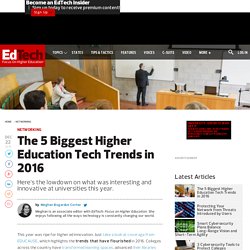
Just take a look at coverage from EDUCAUSE, which highlights the trends that have flourished in 2016. Colleges across the country have transformed learning spaces, advanced their libraries technologically, and bolstered campus security. Along with increases in cloud adoption, the rise of virtual reality and stronger cybersecurity programs, here’s a look back at the biggest higher ed tech trends of 2016.
Top 11 Wonderful Tools for Designers To Create ... The 23rd World Computer Congress. Dr.
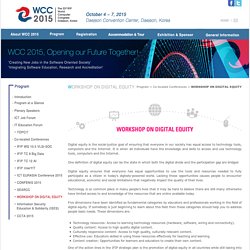
Gabriela Marin has a M.Sc. in Computer Science from Case Western Reserve University, and a Ph.D. in Business Analysis and Research from Texas A&M University. She has been a professor at the Escuela de Ciencias de la Computación e Informática of the Universidad de Costa Rica (UCR) since 1980. From 1988 to 2008 she was the Chairperson of the Graduate Program in Computer Science and Informatics. INTERVIEWS: Dr Hamadoun Touré, Secretary-General of the International Telecommunication Union (ITU) INTERVIEWS by STEPHEN IBARAKI, FCIPS, I.S.P., ITCP/IP3P, MVP, DF/NPA, CNP, FGITCA Dr Hamadoun Touré, Secretary-General of the International Telecommunication Union (ITU) This week, Stephen Ibaraki has an exclusive interview with Dr Hamadoun Touré.
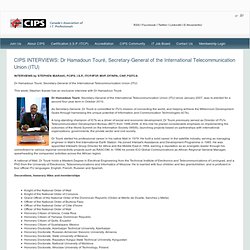
Dr Hamadoun Touré, Secretary-General of the International Telecommunication Union (ITU) since January 2007, was re-elected for a second four-year term in October 2010. As Secretary-General, Dr Touré is committed to ITU's mission of connecting the world, and helping achieve the Millennium Development Goals through harnessing the unique potential of Information and Communication Technologies (ICTs). Wsis. Millennium Development Goals. Voices around the world are demanding leadership in 2015 on poverty, inequality and climate change.
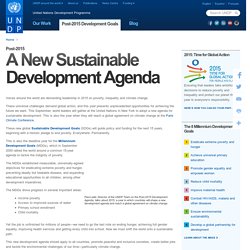
These universal challenges demand global action, and this year presents unprecedented opportunities for achieving the future we want. Un. The eight Millennium Development Goals (MDGs) – which range from halving extreme poverty rates to halting the spread of HIV/AIDS and providing universal primary education, all by the target date of 2015 – form a blueprint agreed to by all the world’s countries and all the world’s leading development institutions.
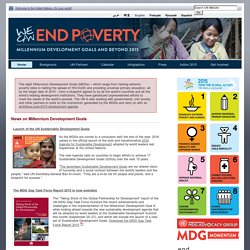
They have galvanized unprecedented efforts to meet the needs of the world’s poorest. The UN is also working with governments, civil society and other partners to build on the momentum generated by the MDGs and carry on with an ambitious post-2015 development agenda. News on Millennium Development Goals Launch of the UN Sustainable Development Goals. 10 Interactive Lessons By Google On Digital Citizenship. 10 Interactive Lessons By Google On Digital Citizenship Added by Jeff Dunn on 2012-07-22 YouTube has a firm place in the current classroom. AirTraffic Worldwide. 11 Reasons Teachers Aren't Using Technology #edchat #edtech. The #edtech Daily. Working Paper Series on Mobile Learning. UNESCO Mobile Learning Publications Today there are over six billion mobile phone subscriptions worldwide, and for every one person who accesses the internet from a computer two do so from a mobile device.
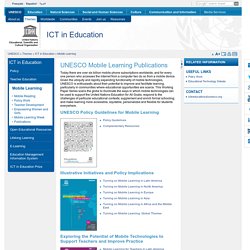
Given the ubiquity and rapidly expanding functionality of mobile technologies, UNESCO is enthusiastic about their potential to improve and facilitate learning, particularly in communities where educational opportunities are scarce. This Working Paper Series scans the globe to illuminate the ways in which mobile technologies can be used to support the United Nations Education for All Goals; respond to the challenges of particular educational contexts; supplement and enrich formal schooling; and make learning more accessible, equitable, personalized and flexible for students everywhere.
Peut-on enseigner avec des mobiles ? Dans la plupart des établissements, l'usage du téléphone portable en cours est interdit. Pourtant les mobiles peuvent être aussi des outils pour enseigner. C'est ce qu'a voulu montrer et évaluer l'Unesco qui publie une étude sur "apprendre avec les mobiles en Europe". Le boson de Higgs : qu'est-ce que c'est ? The Guide To 88 Social Media & Monitoring Tools -
How-To use Twitter with success for Education and more… Ever wanted to use Twitter but didn’t find its utility?
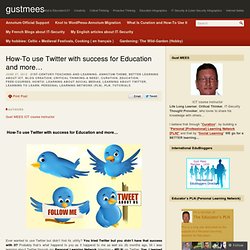
Learning and Skills (LAS13uk) sur Twitter. The #edtech Daily. 40 Ways Education Technology Will Be Used In The Future. Boson de Higgs. President of Ireland Mary McAleese celebrates 500,000 ECDL Students in Ireland with ICS Skills. Internet Hall of Fame Inductees Honored at Historic First Annual Awards Ceremony in Geneva, Switzerland. Internet Society celebrates inductees’ landmark achievements at Global INET 2012 [Washington, D.C. and Geneva, Switzerland – 23 April 2012] – The names of the inaugural Internet Hall of Fame inductees were announced today at the Internet Society’s Global INET 2012 conference in Geneva, Switzerland.
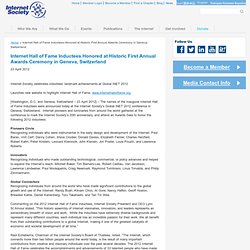
Internet pioneers and luminaries from around the world gathered at the conference to mark the Internet Society’s 20th anniversary, and attend an Awards Gala to honor the following 2012 inductees: Pioneers Circle Recognizing individuals who were instrumental in the early design and development of the Internet: Paul Baran, Vint Cerf, Danny Cohen, Steve Crocker, Donald Davies, Elizabeth Feinler, Charles Herzfeld, Robert Kahn, Peter Kirstein, Leonard Kleinrock, John Klensin, Jon Postel, Louis Pouzin, and Lawrence Roberts. Innovators Global Connectors. IXPs - Internet Exchange Points - Internet Issues. Anmeldung - Veranstaltungen - Forum Bildung. Tagung «Förderung der MINT-Kompetenzen» Pourquoi il faut apprendre à coder à tous nos élèves.
Towards Knowledge Societies for Peace and Sustainable Development. Open source e-portfolio and social networking software - Mahara ePortfolio System. Leaving The Guild Site. Cloud computing : les conseils de la CNIL pour les entreprises qui utilisent ces nouveaux services. L'expression " informatique en nuage " ou " Cloud computing " désigne le déport vers " le nuage Internet "* de données et d'applications qui auparavant étaient situées sur les serveurs et ordinateurs des sociétés, des organisations ou des particuliers.
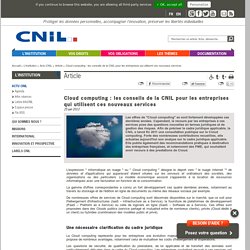
Le modèle économique associé s'apparente à la location de ressources informatiques avec une facturation en fonction de la consommation. La gamme d'offres correspondantes a connu un fort développement ces quatre dernières années, notamment au travers du stockage et de l'édition en ligne de documents ou même des réseaux sociaux par exemple.
Les logiciels libres dans l'enseignement de l'informatique au lycée - 13es RMLL du 7 au 12 juillet 2012. L’informatique à l’école : il ne suffit pas de savoir cliquer sur une souris.